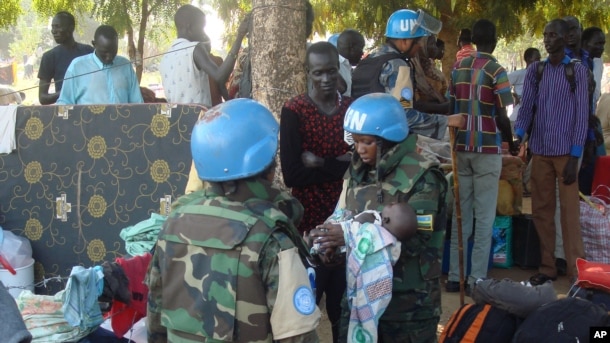Report: Aid Workers, Particularly Americans, Were Targets in S. Sudan Attacks

Jill Craig
NAIROBI — South Sudanese troops gang-raped, beat, and robbed aid workers, specifically targeting Americans, at a hotel compound in Juba on July 11, according to an Associated Press report published Monday.
Witnesses interviewed by the news agency said soldiers carried out mock executions and forced the foreigners to watch as they killed a local journalist.
The AP report also alleges that people at the Terrain hotel compound, a popular venue for expatriates and South Sudanese elites, called for help for hours from the U.N. peacekeeping force, located less than a kilometer away, and from the U.S. embassy.
The U.S. Permanent Representative to the United Nations, Samantha Power, cited failings by both South Sudan’s government and U.N. peacekeepers.
“Throughout this three-year conflict, the government of South Sudan has routinely allowed impunity for murder and sexual violence,” Power said in a statement.
“We are deeply concerned that the United Nations peacekeepers were apparently either incapable or unwilling to respond to calls for help. We have requested and are awaiting the outcome of an investigation by the United Nations and demand swift corrective action in the event that these allegations are substantiated,” she said.
When asked why the U.N. ignored calls for help, Farhan Haq, a spokesman for the U.N. secretary-general, said they “take this incident very seriously,” and the U.N. would investigate it further.
Power addressed the allegation made by witnesses at the Terrain compound to the AP that the U.S. embassy was unresponsive to their pleas for help, saying the mission “responded to distress calls from the compound and urgently contacted South Sudanese government officials, who sent a response force to the site to stop the attack.»

United Nations Mission in South Sudan (UNMISS) peacekeepers, seen here in a July 14, 2016, photo at a U.N. camp in Juba, South Sudan, are often criticized for not doing enough to protect civilians.
Risking departure of aid workers
Hannah Bryce, assistant head of the international security department at London-based Chatham House, says that the South Sudanese authorities will need to provide, and be seen to provide, an appropriate response.
“I think there will be considerable international pressure for the perpetrators of this attack to be held to account,” said Bryce. “For the South Sudanese authorities, there will be a concern that if international aid workers are targeted for attacks, then many will leave taking the essential services and aid they provide with them.”
The attack took place during three days of fierce fighting in Juba between President Salva Kiir’s SPLA forces and then First Vice President Riek Machar’s SPLA in Opposition. The clashes killed at least 270 people, displaced 36,000 civilians and left an August 2015 peace deal in jeopardy.
The U.N. Security Council has authorized a resolution sponsored by the United States to send in 4,000 additional regional peacekeepers to protect civilians. But are more troops enough?
“Whilst the council has authorized the force to use all necessary means to accomplish its mandate, actually doing so could be a turning point for UNMISS in South Sudan,” Bryce said.
This is not the first time the UNMISS force has come under criticism for failures to intervene to protect civilians. Internal U.N. investigation findings released in June found that peacekeepers made serious mistakes in the U.N. Protection of Civilians Site in Malakal, a city in northern South Sudan. The camp came under attack in February when fighting broke out between rival groups. In that case, the report outlined a “combination of inaction, abandonment of post and refusal to engage.” During this incident, at least 30 internally displaced persons were killed and 123 were wounded.
In July, at least two South Sudanese women died from injuries resulting from rape by South Sudanese government soldiers outside the U.N. camp in Juba, the Associated Press reported. Dozens of other women and girls were also raped. A witness told the AP that 30 peacekeepers watched as two armed soldiers dragged away a woman who was less than a few hundred meters from the U.N. camp’s western gate.
“They didn’t venture out of the compound to help women being assaulted right outside, nor did they respond to rescue the people at Terrain just one kilometer away,” said Jehanne Henry, a senior researcher at Human Rights Watch. “There may be good reasons for this to do with the government’s restrictions and the impact of fighting around the base, but [it] certainly stands out as an example of failure to uphold its protection role.”
Tensions between UNMISS and the government will likely continue to grow. South Sudan’s government has refused to accept the U.N. resolution and indicated it will not cooperate, citing reasons of sovereignty.

